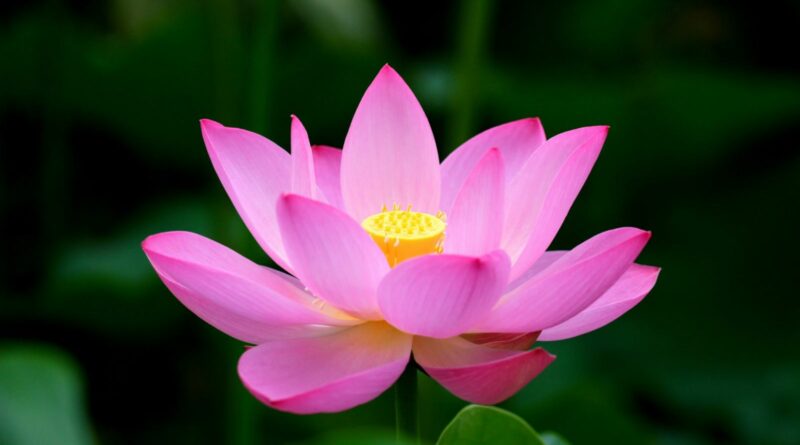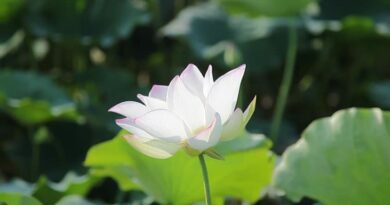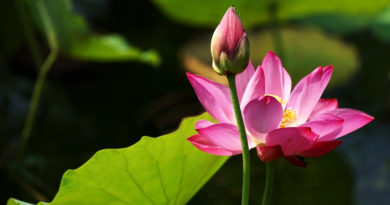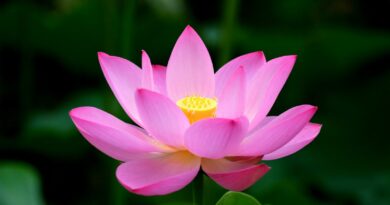Answers By Mr. S. N. Goenka: Cause And Effect
MAIN CONTENT
- Aren’t there any chance happenings, random occurrences without a cause?
- Can you describe in practical terms what is happening in the body and in the mind, how this law of cause and effect works, and how this change can help us?
- Are you saying that everything in this life is predetermined?
- But surely the actions of others also affect us?
- What is destiny?
- How can we help each other if each person must face the results of his own actions?
- Why do people cause suffering for us?
- Isn’t suffering a natural part of life? Why should we try to escape from it?
- Can’t the experience of suffering ennoble people and help them to grow in character?
- If one does something wrong, then one is bound to suffer in the future?
- Are only human beings in misery? Are other beings living a harmonious life?
- We are used to understanding that there is a cause behind every effect. If that is so, then what is the cause behind the existence of this world of mind and matter?
- How can we avoid karma?
- If all causes have a specific effect, how do we have freedom of choice to liberate ourselves from our karma?
- Somebody does an evil deed and goes to the lower world. Someone else does the same amount of evil, it bears fruit immediately and he gets it over with in this life. Why is there this difference?
- Why did God give birth to human beings?
- Is being wealthy good karma? If it is, does that mean that most people in the West have good karma, and most people in the Third World have bad karma?
- Many people in India live in poverty. Do these people have to suffer like this because they have bad kamma of the past?
Aren’t there any chance happenings, random occurrences without a cause?
Mr. S. N. Goenka: Nothing happens without a cause. It is not possible. Sometimes our limited senses and intellects cannot clearly find it, but that does not mean that there is no cause.
Can you describe in practical terms what is happening in the body and in the mind, how this law of cause and effect works, and how this change can help us?
Mr. S. N. Goenka: The Buddha said that understanding the Dhamma is nothing other than understanding the law of cause and effect. You have to realize this truth within yourself. In a ten-day course, you have the opportunity to learn how to do this. This investigation of truth pertaining to matter, pertaining to mind and pertaining to the mental concomitants, the mental contents, is not merely for the sake of curiosity, but to change your mental habit pattern at the deepest level of the mind. As you keep proceeding, you will realize how the mind influences matter, and how matter influences the mind.
Every moment, within the framework of the body, masses of subatomic particles-kalāpas-arise and pass away, arise and pass away. How do they arise? The cause becomes clear as you-investigate the reality as it is, without influence from any past conditioning or philosophical beliefs. The material input, the food that you have taken, becomes a cause for these kalāpas to arise. You will also find that kalāpas arise and pass away due to the climatic atmosphere around you. You also begin to understand the formation of the mind-matter structure: how matter helps matter to arise and dissolve, arise and dissolve. Similarly, you understand how mind helps matter to arise and dissolve. You will also notice that at times matter arises from the mental conditioning of the past-that is, the accumulated saṅkhāra (conditioning) of the past. By the practice of Vipassana, all of this starts to become clear. In ten days, you do not become perfect in this understanding but a beginning is made. You learn to observe: At this moment, what type of mind has arisen and what is the content of this mind? The quality of the mind is according to the content of the mind. For example, when a mind full of passion (or a mind full of anger, or a mind full of fear) has arisen, you will notice that as it arises, it helps to generate these subatomic particles.
When the mind is full of passion, within this material structure, subatomic particles of a particular type arise, and there is a biochemical secretion that starts flowing throughout the body with the stream of the blood or otherwise. This type of biochemical flow, which starts because a mind full of passion has arisen, is called kāmāsava (lit.: sensual flow).
Now, as a very objective scientist, you proceed further, simply observing the truth as it is, observing how the law of nature works. When this secretion of kāmāsava starts, since it is the biochemical produced by passion, it influences the next moment of the mind with more passion. Thus, this kāmāsava turns into a craving of-passion at the mental level, which again stimulates kāmāsava, a flow of passion at the physical level. One starts influencing the other, starts stimulating the other, and the passion keeps on multiplying for minutes together, at times for hours together. The behavior pattern of the mind of generating passion is strengthened because of the repeated generation of passion.
And not only passion but also fear, anger, hatred, and craving-every type of impurity that comes in the mind simultaneously generates an āsava (flow). And this āsava keeps stimulating that particular negativity, that particular impurity, resulting in a vicious cycle of suffering. You may call yourself a Hindu, or a Muslim, or a Jain, or a Christian-it makes no difference-the process is such, the law is such, that it is applicable to one and all. There is no discrimination.
Mere understanding at the intellectual level will not help to break this cycle, and may even create difficulties. Your beliefs from a particular tradition may look quite logical, yet these beliefs will create obstacles for you. The intellect has its own limitation. You cannot realize the ultimate truth merely at the intellectual level. The ultimate truth is limitless, infinite, while the intellect is finite. It is only through experience that we are able to realize that which is limitless, infinite. Even those who have accepted this law of nature intellectually are not able to change the behavior pattern of their minds, and as a result they are far away from the realization of the ultimate truth.
This behavior pattern is at the depth of the mind. What is called the “unconscious mind” is actually not unconscious; at all times it remains in contact with this body. And along with this contact of the body, a sensation keeps arising, because every chemical that flows in your body generates a particular type of sensation. You feel a sensation-pleasant, unpleasant or neutral, whatever it is-and with the feeling of this sensation, you keep reacting. At the depth of your mind, you keep reacting with craving, with aversion, with craving, with aversion. You keep generating different types of sankhāras, different types of negativities, different types of-impurities, and the process of multiplication continues. You can’t stop it because there is such a big barrier between the conscious and the unconscious mind. When you practice Vipassana, you break this barrier. Without Vipassana the barrier remains.
At the conscious level of the mind, at the intellectual level of the mind, one may accept the entire theory of Dhamma, of truth, of law, of nature. But still one keeps rolling in misery because one does not realize what is happening at the depth of the mind. Sensations are there in your body every moment. Every contact results in a sensation. This isn’t a philosophy, it is the actual truth which can be verified by one and all.
On the surface, the mind keeps itself busy with outside objects, or it remains involved with games of intellectualization, imagination, or emotion. That is the job of your “tiny mind” (paritta cittā), the surface level of the mind. Therefore you do not feel what is happening deep inside, and you do not feel how you are reacting to what is happening at the deeper level of the mind.
By Vipassana, when that barrier is broken, one starts feeling sensations throughout the body, not merely at the surface but also deep inside because throughout the entire physical structure, wherever there is life, there is sensation. And by observing these sensations, you start realizing the characteristic of arising and passing, arising and passing. By this understanding, you start to change the habit pattern of the mind.
Say, for example, you are feeling a particular sensation which may be due to the food you have eaten, which may be due to the atmosphere around you, which may be due to your present mental actions, or which may be due to your old mental reactions that are giving their fruit. Whatever it may be, a sensation is there, and you are trained to observe it with equanimity and not to react to it; but you keep on reacting because of the old habit pattern. You sit for one hour, and initially you may get only a few moments when you do not react, but those few moments are wonderful moments. You have started changing the habit pattern of your mind by observing sensation and understanding its nature of impermanence. This stops the blind habit pattern of reacting to the sensation and multiplying the vicious cycle of misery. Initially, in an hour, you get a few seconds, or a few minutes of not reacting. But eventually, by practice, you reach a stage where throughout the hour you do not react at all. At the deepest level you do not react at all. A deep change is coming in the old habit pattern. The vicious cycle is broken: your mind was reacting to the chemical process which was manifesting itself as a sensation, and as a result, for hours together, your mind was flooded with a particular impurity, a particular defilement. Now it gets a break for a few moments, a few seconds, a few minutes. As the old habit of blind reaction becomes weaker, your behavior pattern is changing. You are coming out of your misery.
Again, this is not to be believed because the Buddha said so. It is not to be believed because I say so. It is not be believed because your intellect says so. You have to experience it yourself. People coming to these courses have found by their experience that there is a change for the better in their behavior.
Are you saying that everything in this life is predetermined?
Mr. S. N. Goenka: Well, certainly our past actions will give fruit, good or bad. They will determine the type of life we have, the general situation in which we find ourselves. But that does not mean that whatever happens to us is predestined, ordained by our past actions, and that nothing else can happen. That is not the case. Our past actions influence the flow of our life, directing them towards pleasant or unpleasant experiences. But present actions are equally important. Nature has given us the ability to become masters of our present actions. With the mastery we can change our future.
But surely the actions of others also affect us?
Mr. S. N. Goenka: Of course. We are influenced by the people around us and by our environment, and we keep influencing them as well. If the majority of people, for example, are in favour of violence, then war and destruction occur, causing many to suffer. But if people start to purify their minds, then violence cannot happen. The root of the problem lies in the mind of each individual human being, because society is composed of individuals. If each person starts changing, then society will change, and war and destructions will become rare events.
What is destiny?
Mr. S. N. Goenka: For each of us, life moves in a flow. According to our karmas of the past, the flow of our life goes in a particular direction—miserable or happy, whatever it is. This is because of our own karmas; nobody else has created this. Whatever you have done in your past is gone; you can’t help it. But today you are your own master. With your present practice, you can change the entire flow. So destiny can be changed. You are your own master, the master of your present.
(Courtesy: International Vipassana Newsletter, Vol. 21, No. 3, September 1994)
How can we help each other if each person must face the results of his own actions?
Mr. S. N. Goenka: Our own mental actions have an influence on others. If we generate nothing but negativity in the mind, that negativity has a harmful effect on those who come into contact with us. If we fill the mind with positivity, with goodwill toward others, then it will have a helpful effect on those around us. You cannot control the actions, the kamma of others, but you can master yourself in order to have a positive influence on those around you.
Why do people cause suffering for us?
Mr. S. N. Goenka: Nobody causes suffering for you. You cause suffering for yourself by generating tensions in the mind. If you know not to do that, it becomes easy to remain peaceful and happy in every situation.
Isn’t suffering a natural part of life? Why should we try to escape from it?
Mr. S. N. Goenka: We have become so involved in suffering that to be free from it seems unnatural. But when you experience the real happiness of mental purity, you will know that this is the natural state of the mind.
Can’t the experience of suffering ennoble people and help them to grow in character?
Mr. S. N. Goenka: Yes. In fact, this technique deliberately uses suffering as a tool to make one a noble person. But it will work only if you learn to observe suffering objectively. If you are attached to your suffering, the experience will not ennoble you; you will always remain miserable.
If one does something wrong, then one is bound to suffer in the future?
Mr. S. N. Goenka: No, not in the future, but here and now ! The law of nature punishes immediately, at the very moment one starts generating a defilement in the mind. One cannot generate a defilement and feel peaceful. The misery is instant. Only when you realize that suffering is here and now that you will change the habit pattern of generating defilements that lead to wrong verbal or physical action. If you think, ‘Oh, I’ll be punished only in future lives, and I’m not bothered now’, it won’t help.
Are only human beings in misery? Are other beings living a harmonious life?
Mr. S. N. Goenka: Misery is everywhere, but other beings can’t come out of their misery because they can’t observe the reality within themselves. Nature—or if you want to call it “God Almighty”—has given this wonderful power only to human beings, to observe the reality within ourselves and come out of misery. Make use of this wonderful power that is given to us.
We are used to understanding that there is a cause behind every effect. If that is so, then what is the cause behind the existence of this world of mind and matter?
Mr. S. N. Goenka: Ignorance and sankhara (mental conditioning). Because of ignorance we keep generating sankharas and because of sankharas we keep multiplying our ignorance. These two support each other and the entire universe continues because of that, nothing else.
(Courtesy: International Vipassana Newsletter, September 2002 issue)
How can we avoid karma?
Mr. S. N. Goenka: Be the master of your own mind. The whole technique teaches you how to become your own master. If you are not the master of your mind, then because of the old habit pattern, you will keep on performing those actions, that karma, which you don’t want to perform. Intellectually you understand: “I should not perform these actions.” Yet you still perform them, because you do not have mastery over your mind. This technique will help you to become the master of your own mind.
If all causes have a specific effect, how do we have freedom of choice to liberate ourselves from our karma?
Mr. S. N. Goenka: Because of cause. The cause of your understanding this cause of your understanding. This cause of understanding helps you come out of the reaction of generating new sankharas (conditioning of the mind). The cause of ignorance results in generating more and more sankharas and rolling in it. The cause of wisdom results in helping to come out of it. The cause is there, All the time you are using the cause of ignorance. You keep on rolling in misery. Now by practice of Vipassana, you are making use of the cause of wisdom. You don’t make new sankharas.
Somebody does an evil deed and goes to the lower world. Someone else does the same amount of evil, it bears fruit immediately and he gets it over with in this life. Why is there this difference?
Mr. S. N. Goenka: Because one understands what Vipassana is. In Vipassana, the fruit of the past life will come up first as a sensation on the body. If it was an evil deed, very unpleasant sensations will arise in the body. For example, if you abuse or hit somebody, you generate anger. When you generate anger you are burning inside, so whenever the fruit of this seed comes it will come with burning. When burning comes you are trained how to observe it, it loses all its strength and passes away.
Suppose a thorn has gone into your flesh. As it goes in it is very painful. If you want to take it out, you have to use a needle to go in deep. Again it is painful. Whatever sensation you experienced while performing an action, the same type of sensation you will experience while getting the fruit of it. Those who are good Vipassana meditators will observe, not react, not allow it to multiply, and it passes away. You are free from it. If you don’t practise like this, then naturally you will get the fruit of it later.
Why did God give birth to human beings?
Mr. S. N. Goenka: Our own actions gave birth to us. Depending on the kind of actions we indulge in, during the moment of death those similar kinds of sakhāras raise their heads and become the cause of the next life. We alone are responsible. Why blame poor God? What kind of God would bother to give us birth again and again and put us through so much misery? Why blame him? We are responsible and want to put the blame on somebody else. Purify yourself and you will see that you become free from the cycle of birth and death.
Is being wealthy good karma? If it is, does that mean that most people in the West have good karma, and most people in the Third World have bad karma?
Mr. S. N. Goenka: Wealth alone is not a good karma. If you become wealthy but remain miserable, what is the use of this wealth? Having wealth and also happiness, real happiness – that is good karma. Most important is to be happy, whether you are wealthy or not.
Many people in India live in poverty. Do these people have to suffer like this because they have bad kamma of the past?
Mr. S. N. Goenka: Well, if you believe in the law of nature, that as you sow, so you will reap, then certainly they do. Anybody who is suffering must have done something wrong in the past. But this should not make you feel, “I will never come out of my misery, I have done so much wrong in the past and my destiny is such.” All the past kamma that you have done is done. Your present kamma is important and so powerful. If you are a Vipassana meditator, have confidence. If a person like Angulimāla, who had killed 999 people in this very life (and we don’t know what he had done in the past), could eradicate his past kamma by the practice of Vipassana, why have pessimism? Have all the optimism. You have this wonderful technique by which you can come out of all your misery.
Source: https://www.vridhamma.org






